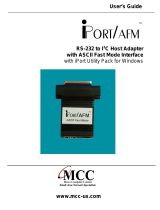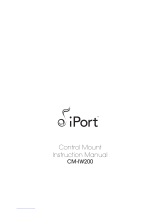Page is loading ...

8600
8000S
8000S
Stack
Link aggregation
1 Gigabit link
10/100 link
CORE
EDGE
x900
Servers
Allied Telesis www.alliedtelesis.com
Network Resiliency Solutions
x900 Advanced Gigabit Layer 3+ Expandable Switches
Tested Solution: VCStack + Link Aggregation
Prior to the advent of the Virtual Chassis Stacking (VCStack) solution, high availability in enterprise networks was achieved by
provisioning redundant links (with STP) and redundant routers (with VRRP). In normal operation, bandwidth and routing power would
sit idle in the network.
Allied Telesis now provides a truly resilient network. In normal operation, all bandwidth and all routing power in the network are fully
available for use all the time. If a link or device fails, some of the bandwidth or forwarding power will be lost, but the network will still
be fully operational and all remaining resources will continue to be fully utilized.
Diagram 1: VCStack + Link Aggregation
Key Benefits of the solution
Full bandwidth utilization and maximum availability
The key advantage comes from configuring the links from the edge to the core using 802.3ad link aggregation.This is possible
because VCS supports link aggregation on ports across different virtual chassis members, providing:
■
Full network bandwidth, as both ports are active; no links are blocked, as some would be with spanning tree.
■
Minimal network disruption if a link fails.The process within a switch when an aggregated link fails is very simple and the virtual
chassis almost instantly adapts its data forwarding on the loss of the link.

Customers benefits
Customer requirements met with the VCStack + Link Aggregation resiliency solution:
■
A resilient solution without using Spanning Tree
■
A simpler replacement for VRRP and/or other legacy redundancy protocols
■
Simpler network management - the virtual chassis is managed as a single unit.
Allied Telesis www.alliedtelesis.com
NETWORK RESILIENCY SOLUTIONS
| VCStack + Link aggregation
Allied Telesis Products
The following products support Virtual Chassis Stacking:
■
SwitchBlade x908 advanced Layer 3 modular switch
■
x900-12X and 24X series advanced Gigabit L3+ expandable switches
This solution utilizes the following products at the network edge:
■
AT-8600 series Layer 3 Fast Ethernet switches
■
AT-8000S series stackable Fast Ethernet edge switches
x900-24XT
x900-24XT
8600 8000S
Server farm
Resiliency Link
10/100
1 Gigabit
Stacking
Link Aggregation
The dedicated stacking link is backed up by
a further resiliency link. If the stacking link
fails, communication between the stack
members is maintained to enable graceful
reconfiguration.
Link aggregation to the servers
creates a resilient connection to
important data, providing
load-sharing and high availability.
Link aggregation between the virtual
chassis and edge switches provides full
bandwidth and resiliency and negates the
need to configure spanning tree.
8000S
Stack
Stackable edge switches
increase resiliency and
port density, while
providing simplified
management as a single
virtual switch.
All switch tables are
synchronized across the
stack, ensuring no loss of
forwarding information in
the event of a stack
member failing.
Please see "Resilient Networking with VCStack" for more information on Allied Telesis Virtual Chassis Stacking solution.
www
.alliedtelesis.com/solutions

Allied Telesis www.alliedtelesis.com
NETWORK RESILIENCY SOLUTIONS
| VCStack + Link aggregation
x900 Configuration
log buffered level errors
log host 192.168.10.11
log host 192.168.10.11 level debugging
access-list 1 permit 192.168.10.13
snmp-server enable trap auth nsm
snmp-server community public ro 1
snmp-server host 192.168.10.13 version 2c public
stack resiliencylink eth0
stack 1 priority 1
vlan database
vlan 169-172 state enable
interface port1.0.1
switchport
switchport mode access
switchport access vlan 169
static-channel-group 1
interface port2.0.1
switchport
switchport mode access
switchport access vlan 169
static-channel-group 1
interface port1.0.3
switchport
switchport mode access
switchport access vlan 170
static-channel-group 2
interface port2.0.3
switchport
switchport mode access
switchport access vlan 170
static-channel-group 2
interface port1.0.5
switchport
switchport mode access
switchport access vlan 171
static-channel-group 3
All log messages are sent to a syslog server. Higher-severity
log messages are also buffered on the switch itself
A resiliency link backs up the dedicated stacking link. If the
stacking link fails, communication is maintained to allow
graceful reconfiguration
Use priority to pre-elect the VCStack master switch
Allow read-only SNMP monitoring from one management
station
Create link aggregation groups across the VCStack
members for resiliency. One for servers, and three for
edge switches
Create VLANs.VLAN 169 for servers, and VLANs 170-172
for connectivity to edge switches

Allied Telesis www.alliedtelesis.com
NETWORK RESILIENCY SOLUTIONS
| VCStack + Link aggregation
interface port2.0.5
switchport
switchport mode access
switchport access vlan 171
static-channel-group 3
interface port1.0.7
switchport
switchport mode access
switchport access vlan 172
static-channel-group 4
interface port2.0.7
switchport
switchport mode access
switchport access vlan 172
static-channel-group 4
interface vlan169
ip address 192.168.169.1/24
interface vlan170
ip address 192.168.170.1/24
ip dhcp-relay server-address 192.168.169.254
interface vlan171
ip address 192.168.171.1/24
ip dhcp-relay server-address 192.168.169.254
interface vlan172
ip address 192.168.172.1/24
ip dhcp-relay server-address 192.168.169.254
ip route 0.0.0.0/0 192.168.169.254
ntp server 192.168.10.11
end
Assign an IP address to each VLAN. Configure DHCP relay
to forward DHCP requests to the server
Create link aggregation groups across the VCStack
members for resiliency. One for servers, and three for
edge switches
Configure a default route to external networks
Configure NTP (Network Time Protocol) with the IP
address of the NTP server

Allied Telesis www.alliedtelesis.com
NETWORK RESILIENCY SOLUTIONS
| VCStack + Link aggregation
8600 Configuration
set system distinguished="cn=switch1, o=alliedtelesis, c=nz"
enable system security
set switch port=1-24 bclimit=3000 mclimit=3000 dlflimit=3000
create vlan="edge" vid=171
add vlan="171" port=1-26
enable stp="default"
set stp="default" mode=rapid
disable stp="default" port=1-24
create switch trunk=aggregation port=25-26 speed=1000m
enable portauth=8021x
enable portauth=8021x port=1-24 type=authenticator
enable dhcpsnooping
enable dhcpsnooping arpsecurity
enable dhcpsnooping log=arpsecurity
set dhcpsnooping port=25 trusted=yes
set dhcpsnooping port=26 trusted=yes
enable ip
add ip int=vlan171 ip=192.168.171.34
add ip route=0.0.0.0 interface=vlan171 nexthop=192.168.171.1
add radius server=192.168.10.34 secret="testing123-2"
port=1812 accport=1813
add switch l3filter match=dipaddress dclass=host
add switch l3filter=1 entry dipaddress=192.168.171.34
action=deny
add switch l3filter match=none import=true
add switch l3filter=2 entry iport=26 action=nodrop
add switch l3filter=2 entry iport=25 action=nodrop
disable telnet server
Storm control is configured to prevent downstream loops
from affecting the inner layers of the network
To enable secure HTTP management to use certificates, a
distinguished name is required and system security must
be enabled
The two gigabit ports are aggregated together to create a
resilient link to the network core
Spanning tree needs to be disabled on the edge-facing
ports, as it cannot co-exist with 802.1x authentication
DHCP snooping guards against rogue server attacks, server
exhaustion attacks, arp poisoning attacks and IP spoofing
attacks. Any ARP poisoning attempt will be logged
The Radius server is used for authenticating management
sessions and also for authenticating 802.1x clients.
802.1x authentication is enabled on all the client-facing
ports. Clients cannot access the network without being
authenticated
Attach a management IP address to VLAN171, and provide
a default gateway address
By default, all ports are put into VLAN 171
Management access is ONLY possible via the core-
connected aggregated link. Access via insecure methods
Telnet and HTTP are blocked

Allied Telesis www.alliedtelesis.com
NETWORK RESILIENCY SOLUTIONS
| VCStack + Link aggregation
enable ssh server serverkey=1 hostkey=0 expirytime=1
logintimeout=60
add pki certificate="cer_name" location=cer_name.cer trust=true
set http server security=on sslkey=2 port=443
create log output=1 destination=syslog server=192.168.10.11
secure=yes message=20
add log output=1 filter=1 severity=>1
enable snmp
enable snmp authenticate_trap
create snmp community=public
enable snmp community=public trap
add snmp community=public manager=192.168.10.13
add snmp community=public traphost=192.168.10.13
enable ntp
add ntp peer=192.168.10.3
Remote management sessions must use SSH and/or
HTTPS
All log messages are sent to a syslog server.
Higher-severity log messages are also buffered on the
switch itself
Allow read-only SNMP monitoring from one management
station. Send traps to that same management station
System time is provided from an NTP server

Allied Telesis www.alliedtelesis.com
NETWORK RESILIENCY SOLUTIONS
| VCStack + Link aggregation
8000S Configuration
interface range ethernet 1/e(1-24),2/e(1-24)
port storm-control broadcast enable
port storm-control include-multicast
exit
interface range ethernet 1/e(1-24),2/e(1-24)
spanning-tree portfast
spanning-tree guard root
exit
interface range ethernet 1/e(1-24),2/e(1-24)
port security mode max-addresses
port security max 3
port security discard trap 60
exit
vlan database
default-vlan vlan 170
exit
interface range ethernet 1/g1,2/g1
channel-group 1 mode on
exit
dot1x system-auth-control
interface range ethernet 1/e(1-24),2/e(1-14)
dot1x single-host-violation discard trap 30
dot1x re-authentication
dot1x port-control auto
exit
ip dhcp snooping
ip dhcp snooping vlan 170
interface port-channel 1
ip dhcp snooping trust
exit
interface vlan 170
ip address 192.168.170.45 255.255.0.0
exit
ip default-gateway 192.168.170.1
Broadcast and multicast limiting prevent downstream loops
from affecting the inner layers of the network
The client-facing ports are configured as portfast so there
is no delay in connectivity when client devices attach. Root
guard protects against STP spoofing attacks
Port security guards against MAC spoofing attacks, and
limits the ability for intruders to connect to the network
By default, all ports are put into VLAN 170
Two gigabit ports, one from each stack member, are
aggregated together to create a resilient link to the
network core
802.1x authentication is enabled on all the client-facing
ports. Clients cannot access the network without being
authenticated
DHCP snooping guards against rogue server and server
exhaustion attacks
Attach a management IP address to VLAN170, and provide
a default gateway

Allied Telesis www.alliedtelesis.com
NETWORK RESILIENCY SOLUTIONS
| VCStack + Link aggregation
radius-server host 192.168.10.34 auth-port 1812 acct-port 1813
key testing123-2
aaa authentication login default radius local
aaa authentication dot1x default radius
management access-list mlist
deny service telnet
deny service http
permit port-channel 1
exit
management access-class mlist
ip ssh server
ip https server
logging 192.168.10.11
logging buffered errors
snmp-server community public ro 192.168.10.13 view Default
snmp-server host 192.168.10.13 public traps 2
sntp client enable vlan 170
clock source sntp
sntp unicast client enable
sntp server 192.168.10.3
line console
autobaud
exit
The Radius server is used for authenticating management
sessions and also for authenticating 802.1x clients
Management access is ONLY possible via the core-
connected aggregated link. Access via insecure methods
Telnet and HTTP are blocked
All log messages are sent to a syslog server.
Higher-severity log messages are also buffered on the
switch itself
Remote management sessions must use SSH and/or
HTTPS
Allow read-only SNMP monitoring from one management
station. Send traps to that same management station
System time is provided from an SNTP server
The console port can auto-detect the terminal data rate

© 2008 Allied Telesis Inc. All rights reserved. Information in this document is subject to change without notice. All company names, logos, and product designs that are trademarks or registered trademarks are the property of their respective owners. 617-000170 Rev. L
NETWORK RESILIENCY SOLUTIONS
| VCStack + Link aggregation
USA Headquarters | 19800 North Creek Parkway | Suite 100 | Bothell | WA 98011 | USA | T: +1 800 424 4284 | F: +1 425 481 3895
European Headquarters | Via Motta 24 | 6830 Chiasso | Switzerland | T: +41 91 69769.00 | F: +41 91 69769.11
Asia-Pacific Headquarters | 11 Tai Seng Link | Singapore | 534182 | T: +65 6383 3832 | F: +65 6383 3830
www.alliedtelesis.com
About Allied Telesis
Allied Telesis is a world class leader in delivering IP/Ethernet network solutions to the
global market place. We create innovative, standards-based IP networks that seamlessly
connect you with voice, video and data services.
Enterprise customers can build complete end-to-end networking solutions through a
single vendor, with core to edge technologies ranging from powerful 10 Gigabit Layer 3
switches right through to media converters.
Allied Telesis also offer a wide range of access, aggregation and backbone solutions for
Service Providers. Our products range from industry leading media gateways which
allow voice, video and data services to be delivered to the home and business, right
through to high-end chassis-based platforms providing significant network infrastructure.
Allied Telesis' flexible service and support programs are tailored to meet a wide range
of needs, and are designed to protect your Allied Telesis investment well into the future.
Visit us online at www.alliedtelesis.com.
/




